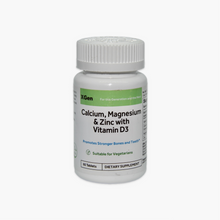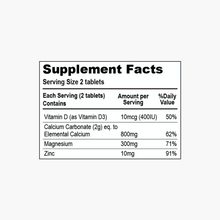- 60 Tablets
- Formulated with Magnesium, Zinc & D3
- Promotes stronger bones & teeth.
- Helps to improve immune system
Additional Information
Our product has been formulated for optimum absorption of Calcium with vitamin D3. Addition of Magnesium is for improved bone density and Zinc is to help improve the immune system. Here is the Calcium Paradox;

Calcium:
According to the USDA 2010 guidelines for Americans, Calcium is one of the four major nutrients adults and children consistently do not get enough of. Your body can store calcium, but it can’t produce it. That’s why you must get the calcium you need from foods, beverages, and dietary supplements.Consuming adequate calcium throughout life may reduce the risk of osteoporosis, a disorder that affects more than 10 million American adults, of whom 80% are women.Calcium absorption is highest during periods of intense growth, such as childhood and pregnancy, as rapidly growing bones spur the high demand for the mineral. With the exception of pregnancy, calcium absorption starts decreasing during adulthood and continues to decrease with age.The first few years after menopause begins mark rapid calcium loss from bones in women. Estrogen production decreases, which causes more bone breakdown and decreased calcium absorption from foods and dietary supplements. Recommended calcium consumption increases for women at age 51, the time menopause typically starts.
You can get calcium from:
- Dairy products, such as cheese, milk and yogurt.
- Dark green leafy vegetables, such as broccoli and kale.
- Fish with soft bones that you can eat, such as sardines and canned salmon.
Vitamin D3:
Vitamin D is a fat-soluble vitamin that helps your body absorb calcium and phosphorus. Having the right amount of vitamin D, calcium, and phosphorus is important for building and keeping strong bones.Your body must have vitamin D to absorb calcium and promote bone growth. Too little vitamin D results in soft bones in children (rickets) and fragile, misshapen bones in adults (osteomalacia). You also need vitamin D for other important body functions.In its active form as calcitriol, vitamin D contributes to skin cell growth, repair, and metabolism. It optimizes the skin's immune system and helps destroy free radicals that can cause premature aging. While the body can produce vitamin D on its own through sun exposure, too much sun accelerates skin aging.
Here are 8 signs and symptoms of vitamin D deficiency.
- Getting Sick or Infected Often
- Fatigue and Tiredness
- Bone and Back Pain
- Depression
- Impaired Wound Healing
- Bone Loss
- Hair Loss
- Muscle Pain
Magnesium:
Magnesium is a nutrient that the body needs to stay healthy. Magnesium is important for many processes in the body, including regulating muscle and nerve function, blood sugar levels, and blood pressure and making protein, bone, and DNA.
Some examples of research on effects of magnesium on health:
High blood pressure and heart disease:
High blood pressure is a major risk factor for heart disease and stroke. Magnesium supplements might decrease blood pressure, but only by a small amount. Some studies show that people who have more magnesium in their diets have a lower risk of some types of heart disease and stroke. But in many of these studies, it’s hard to know how much of the effect was due to magnesium as opposed to other nutrients.
Type 2 diabetes:
People with higher amounts of magnesium in their diets tend to have a lower risk of developing type 2 diabetes. Magnesium helps the body break down sugars and might help reduce the risk of insulin resistance (a condition that leads to diabetes). Scientists are studying whether magnesium supplements might help people who already have type 2 diabetes control their disease. More research is needed to better understand whether magnesium can help treat diabetes.
Osteoporosis:
Magnesium is important for healthy bones. People with higher intakes of magnesium have a higher bone mineral density, which is important in reducing the risk of bone fractures and osteoporosis. Getting more magnesium from foods or dietary supplements might help older women improve their bone mineral density. More research is needed to better understand whether magnesium supplements can help reduce the risk of osteoporosis or treat this condition.
Migraine headaches:
People who have migraine headaches sometimes have low levels of magnesium in their blood and other tissues. Several small studies found that magnesium supplements can modestly reduce the frequency of migraines. However, people should only take magnesium for this purpose under the care of a healthcare provider. More research is needed to determine whether magnesium supplements can help reduce the risk of migraines or ease migraine symptoms.
Zinc:
Zinc is used for treatment and prevention of zinc deficiency and its consequences, including stunted growth and acute diarrhea in children, and slow wound healing. Zinc is needed for the proper growth and maintenance of the human body. It is found in several systems and biological reactions, and it is needed for immune function, wound healing, blood clotting, thyroid function, and much more. Meats, seafood, dairy products, nuts, legumes, and whole grains offer relatively high levels of zinc.
It is also used for boosting the immune system, treating the common cold and recurrent ear infections, and preventing lower respiratory infections. It is also used for malaria and other diseases caused by parasites.
Some people use zinc for an eye disease called macular degeneration, for night blindness, and for cataracts. It is also used for asthma; diabetes; high blood pressure; acquired immunodeficiency syndrome (AIDS); and skin conditions such as psoriasis, eczema, and acne.
Other uses include treating attention deficit-hyperactivity disorder (ADHD), blunted sense of taste (hypogeusia), ringing in the ears (tinnitus), severe head injuries, Crohn’s disease, Alzheimer’s disease, Down syndrome, Hansen’s disease, ulcerative colitis, peptic ulcers and promoting weight gain in people with eating disorders such as anorexia nervosa.
Some people use zinc for benign prostatic hyperplasia (BPH), male infertility, erectile dysfunction (ED), weak bones (osteoporosis), rheumatoid arthritis, and muscle cramps associated with liver disease. It is also used for sickle cell disease and inherited disorders such as acrodermatitis enteropathica, thalassemia, and Wilson’s disease.
Some athletes use zinc for improving athletic performance and strength.
Zinc References:
http://www.webmd.com/vitamins-supplements/ingredientmono-982-zinc.aspx?activeingredientid=982



